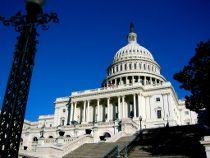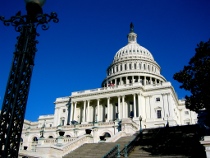Latest from Washington
The USA's Environmental Protection Agency (EPA) announced its plans to phase-in carbon reduction.

 Yesterday, the USA's Environmental Protection Agency (EPA) announced its plans to phase-in carbon reduction. The EPA will regulate some of the highest CO2 emitters: transportation, power plants, and heavy industries. Regulations will phase-in January 2011 and become more stringent into 2012. Part of the plans will impose mileage restrictions on the 2012 vehicles and force power plants and concrete manufactures to purchase Clean Air permits-the permits will ensure they are using the most recent and up-to-date technology to keep carbon footprints at a minimum.
Yesterday, the USA's Environmental Protection Agency (EPA) announced its plans to phase-in carbon reduction. The EPA will regulate some of the highest CO2 emitters: transportation, power plants, and heavy industries. Regulations will phase-in January 2011 and become more stringent into 2012. Part of the plans will impose mileage restrictions on the 2012 vehicles and force power plants and concrete manufactures to purchase Clean Air permits-the permits will ensure they are using the most recent and up-to-date technology to keep carbon footprints at a minimum.
Lisa Jackson, EPA Head, spoke at a press conference: "This is a common sense plan for phasing in the protections of the Clean Air Act. It gives large facilities the time they need to innovate, governments the time to prepare to cut greenhouse gases and it ensures that we don't push this problem off to our children and grandchildren. With a clear process in place, it's now time for American innovators and entrepreneurs to go to work and lead us into the clean energy economy of the future."
While EPA and Jackson have yet to decide upon the specific restrictions that will be imposed on US CO2 emitters, the statement indicates that industry policies and processes will shift green in upcoming years. Phasing-in restrictions in 2012 makes sense for the auto-industry, in which companies devise the plans for new makes and models a year before they hit the market. In addition, the 1-2 year time frame will hopefully allow the EPA to work with Congress, provided the beleaguered climate change bill comes to pass in the next year.
With President Obama hoping to reach across the aisle to Republicans for the climate bill-allowing for off-shore drilling on the East and West Coast provided coastal regions are protected and investing in nuclear power-some optimists believe the bill can indeed pass this year. Since healthcare has passed climate change may have risen higher on the US President's political agenda.
However, politics will be a factor-mid-term elections forthcoming added to Republican outrage over the controversial healthcare bill will make any sweeping legislature difficult to pass-one of the essential parts of the Republican platform is opposition to President Obama's latest policies. Compromises have not been common and Democrats will need 60 votes in the Senate for a bill to pass. Conservative support may be hard to come by, although it is being drafted on a bipartisan committee of Democrat John Kerry, Republican Lindsay Graham, and Independent Libertarian Joseph Lieberman.
And although the EPA is legally allowed to regulate CO2 emissions due to a 2007 Supreme Court ruling, without support of Congress, the scale of carbon mitigation needed to curb emissions will be difficult to achieve. For the sake of international climate negotiations and for the sake of the future, it is essential that the USA enacts domestic CO2 mitigation; the window is closing fast to halt long-term effects of CO2 trapped in the atmosphere.
Author: Michael Good | Climate Action Image Provided by:
Elliot P | Flickr


